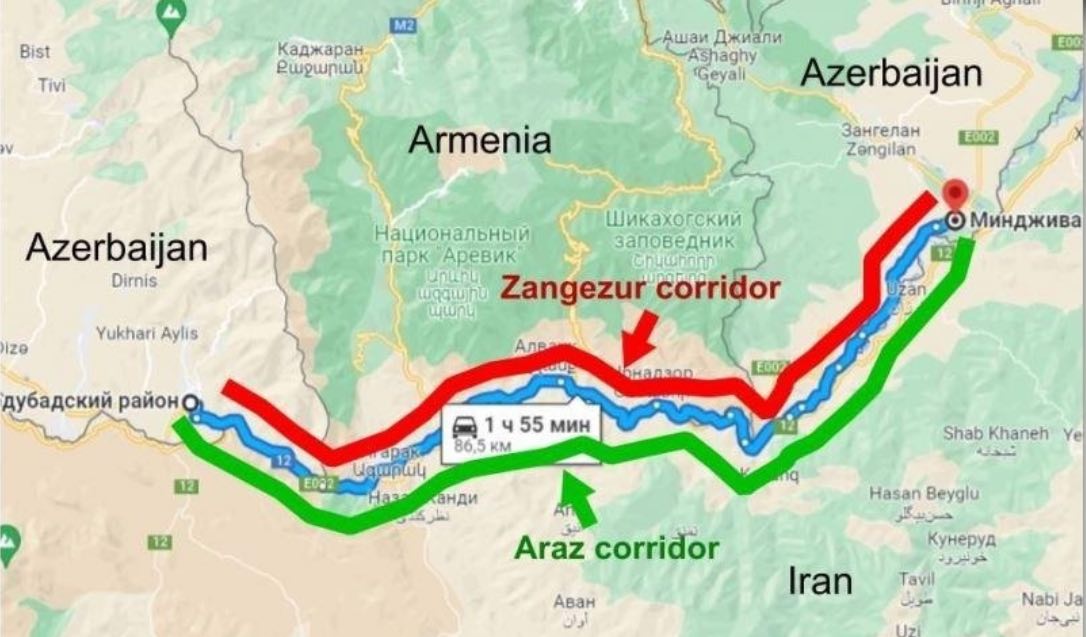Zangezur: A Weakness in Iran’s Foreign Policy
Zangezur: A Weakness in Iran’s Foreign Policy. It seems that the heated discussion about Zangezur in Iranian society largely stems from two issues. Firstly, there’s the ambiguity of such a plan and how it will be implemented.
In other words, it is still unclear exactly what is supposed to happen with this plan. So far, Azerbaijan intends to create a corridor to access a part of its territory located within Armenia’s borders. This corridor will pass through Armenian land adjacent to Iran’s border, which currently does not seem to imply any changes to Iran’s borders with Armenia.
The second issue is the negative perception held by a significant part of Iranian society towards Russia’s policies. In recent years, this sentiment has grown stronger due to the deepening distrust between the government and the people. The writer is often critical of Iran’s policies towards Russia and believes that Russia often looks down on Iran. Russia’s policy towards Iran, as a whole, is seen as preventing Iran from improving relations with the United States and leaning towards the West. However, it is important to note that escalating tensions between Iran and Russia, for reasons that require more detailed discussion, could also pose challenges to Iran’s national interests. Therefore, what is undeniable is that Iran’s policy in this regard should be free from emotions, especially ethnic sentiments.
Another issue worth discussing is the impact that creating the Zangezur corridor could have on Iran’s position in terms of communication and access to Europe. Opponents of such a plan claim that its implementation would block Iran’s access to Europe and the North Caucasus via Armenia. To accurately address this claim, one must consider how important Iran’s communication route through Armenia is, especially compared to the Caspian Sea and Turkey routes.
It seems that the importance of Iran’s communication route to Europe, Russia, and the North Caucasus via the Caspian Sea or Turkey is greater than the route through Armenia. Moreover, one must consider whether the mentioned corridor will cut off Iran’s route to Armenia or not. This is a significant issue that opponents of this plan within Iran seem to have assumed as a given. Regarding Iran’s communication routes, the reality is that routes like the Middle Corridor, which connects China to Turkey and Europe via Central Asia and Azerbaijan, or the East-West Corridor, which links China to Europe via Dubai, Riyadh, and Haifa, as well as Turkey’s development road project, which, if implemented, will connect the port of Faw in Iraq and the ports of Qatar and the UAE to Turkey and Europe, will play a much larger role in bypassing Iran and creating logistical isolation for Iran.
As to why Iran is usually not considered in such plans, various reasons can be cited, from the lack of proper infrastructure to sanctions. However, if we want to speak more broadly, it should be said that due to the decision-makers in Iran not paying attention to multi-faceted policies, Iran’s toolbox in dealing with others is practically empty. As a result, Iran usually cannot play a significant role in such programs.
Regarding the Zangezur corridor, this issue is entirely visible, and what is essential is for Iran to ensure that its communication route with Armenia is not blocked. Although achieving this requires having leverage, persuasion, and threats simultaneously, as mentioned, Iran currently lacks such leverage due to its unilateral relations with others.
The source of such problems and challenges for Iran should be seen as Iran’s inability to shape simultaneous relationships of cooperation and competition with other countries. The result is a reduced ability for Iran to maneuver and play in regional equations. In fact, by adopting an approach that can be referred to as a hedging strategy, while expanding areas of cooperation with other countries, Iran should also possess suitable competitive levers and cards in its relations with them to have the appropriate influence to maximize the country’s interests.

